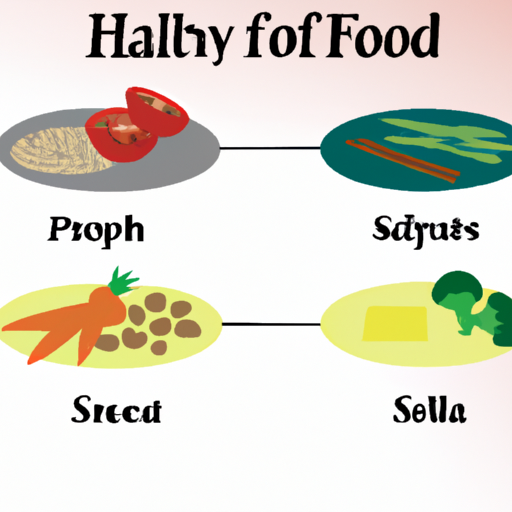In the quest for achieving weight loss goals, many individuals focus solely on exercise and restrictive diets. However, it is crucial to understand that proper nutrition plays a vital role in effective and sustainable weight loss. This article aims to shed light on the importance of proper nutrition for weight loss and delve into the diagnosis, treatment, symptoms, and causes of nutritional imbalances. By exploring these aspects, we can gain a comprehensive understanding of how nutrition impacts weight loss and how to optimize our dietary choices to support our goals. Whether you are embarking on a weight loss journey or seeking to maintain a healthy lifestyle, this article will provide valuable insights into the world of nutrition and its impact on achieving your desired weight.
1. “Understanding the Importance of Proper Nutrition for Effective Weight Loss”
Proper nutrition plays a crucial role in achieving effective weight loss. Many individuals tend to focus solely on exercise when trying to shed pounds, but without a balanced and healthy diet, their efforts may prove to be futile. Understanding the importance of proper nutrition is essential for successful weight loss and long-term weight management.
One of the primary reasons why nutrition is vital for weight loss is that it directly affects our calorie intake. Weight loss occurs when we consume fewer calories than we burn. By following a nutritious diet, we can control our calorie intake and create a calorie deficit, leading to gradual and sustainable weight loss.
Moreover, proper nutrition provides our bodies with the essential nutrients needed for overall well-being. When we consume a balanced diet consisting of fruits, vegetables, whole grains, lean proteins, and healthy fats, we fuel our bodies with the necessary vitamins, minerals, and antioxidants. These nutrients not only support weight loss but also boost our immune system, improve digestion, and enhance our energy levels.
Furthermore, a well-balanced diet helps regulate our metabolism. When we provide our bodies with the right combination of nutrients, our metabolism functions optimally. This means that we are able to efficiently convert food into energy and burn calories effectively. On the other hand, a diet lacking in essential nutrients can slow down our metabolism, making weight loss more challenging.
Proper nutrition also plays a significant role in managing hunger and cravings. When we consume a diet rich in fiber, protein, and healthy fats, we tend to feel fuller for longer periods. This helps prevent overeating and reduces the desire for unhealthy snacks or sugary treats. By satisfying our nutritional needs, we can curb cravings and maintain a healthy eating pattern, which is crucial for achieving sustained weight loss.
In addition to physical health benefits, proper nutrition also positively impacts mental well-being. A nutritious diet can improve mood, reduce stress, and enhance cognitive function. By nourishing our bodies with the right nutrients, we support brain health and emotional stability, which are essential for successful weight loss. A positive mindset is crucial when facing the challenges and setbacks that often accompany weight loss journeys.
In conclusion, understanding the importance of proper nutrition is vital for effective weight loss.
You can find out more about this theme here: https://bbgate.com/threads/simple-methylone-synthesis-bk-mdma.212/.
2. “Diagnosing and Treating Nutritional Imbalances to Support Weight Loss Goals”
Diagnosing and treating nutritional imbalances is crucial when it comes to supporting weight loss goals. Many individuals struggle with weight loss due to a lack of understanding about proper nutrition and the impact it has on their overall health and weight management. By addressing nutritional imbalances, individuals can optimize their weight loss journey and achieve long-term success.
To begin with, diagnosing nutritional imbalances requires a comprehensive assessment of an individual’s diet and lifestyle. This can be done by consulting with a registered dietitian or a healthcare professional specializing in nutrition. They will evaluate the individual’s eating habits, nutrient intake, and any underlying medical conditions that may be affecting their weight loss efforts.
During the diagnostic process, various factors are considered, including calorie intake, macronutrient distribution, micronutrient deficiencies, and the individual’s overall metabolic rate. Each person has unique nutritional needs, and identifying imbalances specific to their body is essential for developing an effective weight loss plan.
Once nutritional imbalances are diagnosed, the next step is to treat them through personalized interventions. This may involve making dietary modifications, incorporating targeted supplementation, and implementing lifestyle changes. A registered dietitian can create a customized meal plan that addresses the individual’s nutrient deficiencies while promoting weight loss.
One common nutritional imbalance that hinders weight loss is consuming excessive calories without considering nutrient density. Many individuals rely on processed and calorie-dense foods, which provide little nutritional value and can lead to overeating. Treating this imbalance involves emphasizing whole, nutrient-dense foods such as fruits, vegetables, lean proteins, and whole grains. Additionally, portion control techniques and mindful eating practices can be incorporated to promote satiety and prevent overconsumption.
Another important aspect of treating nutritional imbalances is identifying and addressing specific deficiencies. For example, inadequate intake of certain vitamins and minerals can impact metabolism, energy levels, and overall health. In such cases, targeted supplementation may be recommended to ensure adequate nutrient levels are achieved.
Furthermore, lifestyle changes play a crucial role in treating nutritional imbalances for weight loss. Regular physical activity not only supports weight loss but also aids in improving overall health and metabolism. Incorporating exercise into a daily routine can help individuals burn calories, build muscle
3. “Exploring the Symptoms and Causes of Poor Nutrition and its Impact on Weight Loss”
Proper nutrition is essential for maintaining a healthy weight, and poor nutrition can significantly hinder weight loss efforts. Understanding the symptoms and causes of poor nutrition is crucial in addressing this issue and achieving successful weight loss.
Symptoms of poor nutrition can manifest in various ways. One common symptom is fatigue or lack of energy, as the body may not be receiving enough essential nutrients to support its functions. Additionally, individuals with poor nutrition may experience frequent illness or have a weakened immune system due to a lack of vitamins and minerals. Other symptoms can include hair loss, brittle nails, dry skin, and even depression or mood swings.
There are several causes of poor nutrition that can contribute to weight loss challenges. One significant cause is a diet high in processed foods, sugars, and unhealthy fats. These types of foods often lack the necessary nutrients and can lead to overeating without feeling satiated, resulting in weight gain rather than loss. Additionally, poor nutrition can be the result of inadequate portion control or skipping meals, leading to imbalances in nutrient intake.
Another cause of poor nutrition is a lack of knowledge or awareness about healthy eating habits. Many individuals may not fully understand the importance of a balanced diet or how to make informed food choices. This lack of education can lead to poor decision-making when it comes to selecting nutritious foods, ultimately affecting weight loss goals.
The impact of poor nutrition on weight loss efforts is significant. Without proper nourishment, the body may struggle to burn calories efficiently, which can slow down the metabolism. This can make it more challenging to create a calorie deficit necessary for weight loss. Additionally, poor nutrition can lead to cravings for unhealthy foods, making it harder to resist temptation and stick to a healthy eating plan.
Addressing the symptoms and causes of poor nutrition is vital for successful weight loss. It is crucial to make dietary changes that promote a well-rounded, balanced diet. Incorporating a variety of fruits, vegetables, whole grains, lean proteins, and healthy fats can provide the body with the necessary nutrients for optimal function and weight loss. Seeking guidance from a registered dietitian or nutritionist can also be beneficial in understanding individual nutritional needs and creating a personalized plan.
In conclusion, poor nutrition can


